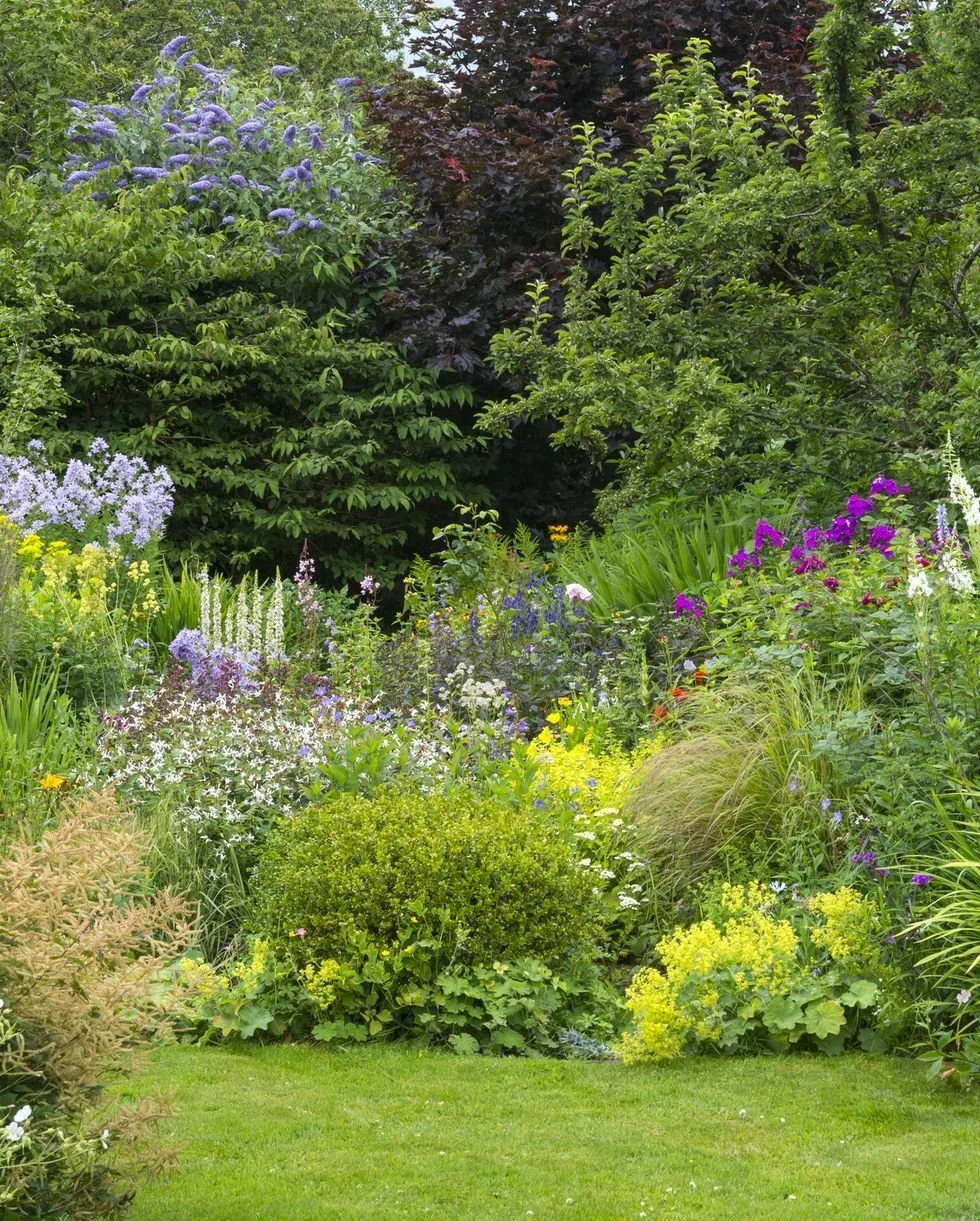Not Just Gardens, But Ecosystems
Written by: Lalla Masondo
Edited by: Beatrice Bos
Often, we build our homes in wild untamed lands and work twice as hard to control them in the name of aesthetic and style. With many practices of gardening, human beings exclude themselves from these ecosystems and fail to recognise the large-scale impacts of these beloved creations: our gardens highlight this ignorance. Subtle but impactful, the clean-cut lawns and geometrically aligned shrubs we place in our gardens do not match the free-flowing irregular structures we find in nature. This makes most gardens difficult to maintain, often requiring large amounts of water and emitting great quantities of CO2. For this reason, we are witnessing a decreasing amount of biodiversity in urban areas and an increase in CO2 emission from garden maintenance. However, the morning bird choirs do not have to go silent, and the wildflowers can still bloom. With practices like permaculture, ecological gardening, or urban farming, we do not have to trade biodiversity and healthy ecosystems for aesthetic and clean lawns. We can have both.
Understanding the Impacts of Traditional Gardens
Traditional gardening attempts to control nature by using a multitude of techniques and chemicals to keep gardens clean and healthy, but at what cost?
Soil holds around 2,500 gigatons of carbon dioxide. Tilling, a practice commonly used in gardens before planting, loosens the structure of the soil by breaking it apart, creating a fluffy appearance. Tilling however exposes carbon dioxide in the soil to the atmosphere, releasing it back into the air. This then increases the amount of carbon dioxide in the atmosphere, contributing to heightened CO2 levels.
But the emissions don’t end there: lawns require a hefty amount of fuel and chemicals to keep them looking presentable. The use of gas-powered equipment to mow our lawns has a substantial environmental impact. In 2020, around 5% of the total air pollution in the United States came from lawn mowers. Lawn mowers require approximately 800 million gallons of gasoline annually and emit large amounts of harmful gases such as carbon monoxide, hydrocarbons and nitrogen oxide. In fact, one gas-powered lawn mower releases the same amount of pollution in one 1 hour as a car driving for 45 miles (72,4205 kilometres).
The impacts of lawn maintenance, however, go beyond lawn mowing. Synthetic fertilizers are known to have negative contributions to environmental health. Lawns cannot hold the amount of nitrogen in fertilizers; because of this, additional nitrogen is converted into nitrous gas by soil microbes. Nitrous gas is the third most significant greenhouse gas in the atmosphere and has a greater ability to trap heat than carbon dioxide. Gardens are also believed to consume around 150 to 200 litres of water daily, which can have an impact on water supply.
Pesticides are chemicals designed to kill and ward off pests as well as disease carriers. Issues arise when pesticides kill more than just pests. Pesticides can be toxic to many helpful insects that are vital for pollination, as well as earthworms, which help increase soil drainage and aeration. They can also be fatal to mammals and many other wildlife species. Aside from their impact on biodiversity, pesticides have historically proven to be toxic pollutants like DDT (Dichlorodiphenyltrichloroethane), and agent orange. At times, pesticides are transported by water into freshwater systems. This then contaminates the water and can kill off biodiversity residing in that area.
So, what’s the alternative?
Nature has never needed pesticides to thrive, or synthetic fertilisers to be bright, lush and green. It has never relied on toxic chemicals to survive either. However, in an effort to tame the wild force that is nature, we have made use of every chemical and every machine to keep things presentable. To reduce the harm caused, we must strive for ecosystems instead of gardens; beauty should not come at the price of biodiversity. We can have both.
Permaculture is a system built on the principles of earth care, people care and fair share. Permaculture strives to create sustainable gardens that produce more energy than they consume. This system emphasises minimal waste production and seeks to avoid negatively impacting spaces, whether that impact is social or environmental.
Permaculture works with nature instead of against it. These systems do so by:
Catching and storing energy like rainwater or solar power for later use
Ensuring every plant serves more than one purpose, such as attracting pollinators and producing herbal teas, or deterring pests and nurturing the soil
Using mulch to keep soil moist and using food scraps as natural fertilizer
Including water features to cater for birds and insects passing by
Emphasising community and zero waste, meaning that when there is surplus food or herbs, it is shared with the community
Ensuring that every function is served by multiple elements, therefore a backup is always provided in case one element fails
Mimicking natural patterns found in nature, such as branching patterns and spirals
Permaculture is however not the only way to garden sustainability. Lawn mowed grass can be replaced with plants like clovers, creeping thyme, moss, and Corsican mint. Letting gardens be pools of native plants will be of great benefit to local biodiversity, as well as adding birdhouses and brush piles to the garden. Allowing native wildflowers to be wild and honouring the magic of the butterflies that arrive as those flowers begin to bloom, is also a great way to create a sustainable garden. All of these actions fall within the term ecological gardening, striving to bring ecological principles of balance into our gardens.
When using these methods, neither beauty nor biodiversity have to be sacrificed. Flora and fauna thrive and live freely while we preserve the beauty and serenity that our gardens hold. With an understanding of the effects of our gardens, we can seize the opportunity to cultivate a more harmonious relationship with nature in our own space. Gardens are not just gardens: they are ecosystems.
References
Carson, K. (2023). Gas-powered lawn tools generate a surprising carbon footprint. [online] newscentermaine.com. Available at: https://www.newscentermaine.com/article/news/special-reports/maines-changing-climate/lawn-tools-generate-a-surprising-carbon-footprint-maines-changing-climate-maine-environment-pollution/97-69cc0f79-68c0-4e29-906e-5392b395f6df.
Cho, R. (2018). Can Soil Help Combat Climate Change? [online] State of the Planet. Available at: https://news.climate.columbia.edu/2018/02/21/can-soil-help-combat-climate-change/.
Editor, E. (2018). How Do Fertilizers Affect the Environment - Environment News South Africa. [online] Environment News South Africa. Available at: https://www.environment.co.za/environmental-issues/how-do-fertilizers-affect-the-environment.html.
Garden-tips.co.za. (2023). Garden Tips: Traditional Gardening vs Ecological Gardens. [online] Available at: https://www.garden-tips.co.za/Ecogardens.html.
Lamp’l, J. (2024). Ecological Gardening | Creating Beauty & Biodiversity | joegardener®. [online] joe gardener® | Organic Gardening Like a Pro. Available at: https://joegardener.com/podcast/ecological-gardening-creating-beauty-biodiversity/.
National Geographic (2023). Ecosystem. [online] education.nationalgeographic.org. Available at: https://education.nationalgeographic.org/resource/ecosystem/.
Pesticide Action Network (2019). Pesticides and the loss of biodiversity. [online] PAN Europe. Available at: https://www.pan-europe.info/issues/pesticides-and-loss-biodiversity.
Robinson, V. (2024). increasing biodiversity by creating an eco-friendly yard - Nature Forward. [online] Nature Forward. Available at: https://natureforward.org/increasing-biodiversity-by-creating-an-eco-friendly-yard/.
Son, J. (2020). Lawn Maintenance and Climate Change. [online] PSCI. Available at: https://psci.princeton.edu/tips/2020/5/11/law-maintenance-and-climate-change.
Thegardener.co.za. (2025). Water Saving. [online] Available at: https://www.thegardener.co.za/the-gardener/maintenance/water-saving/
youmatter (2020). Ecosystem: Definition, Importance, Examples, Human Causes And Effects. [online] Youmatter. Available at: https://youmatter.world/en/definition/ecosystem-definition-example/.


